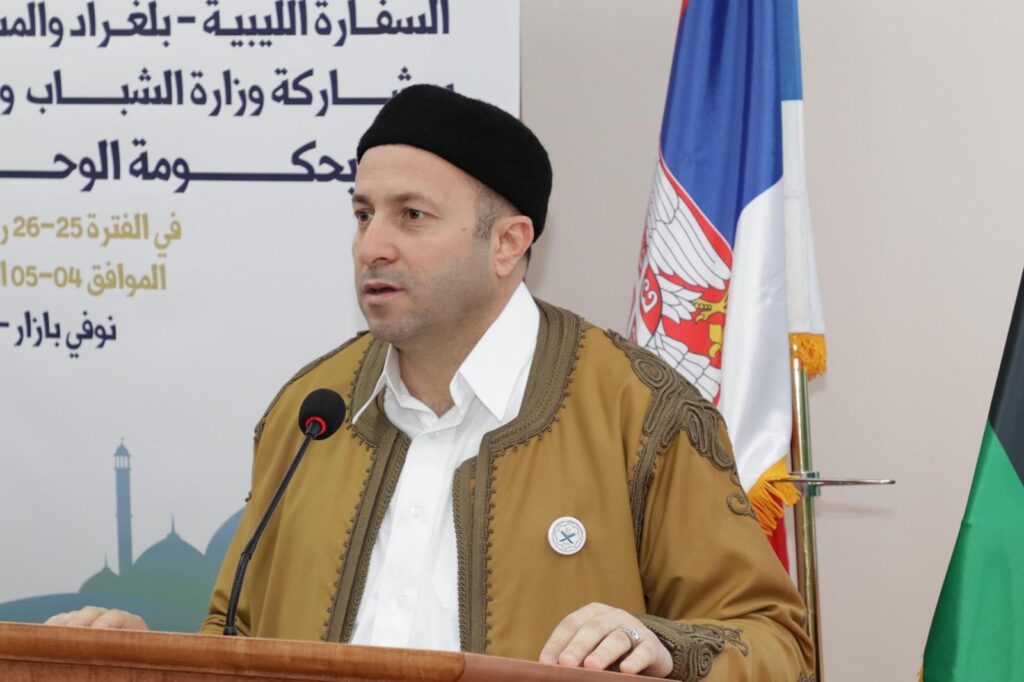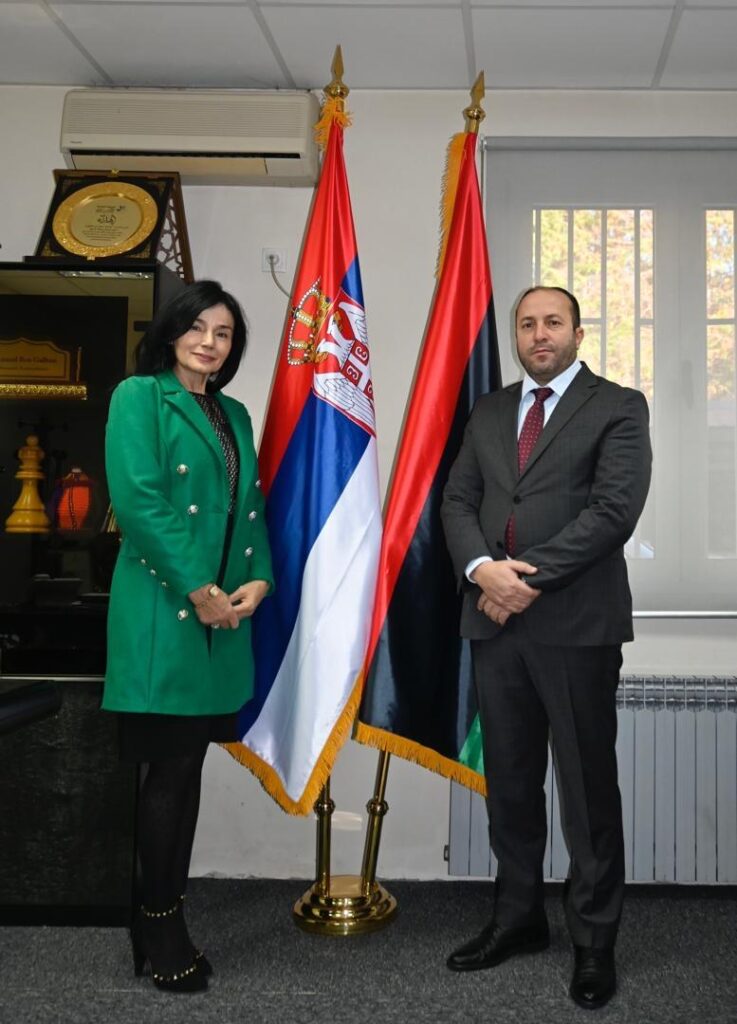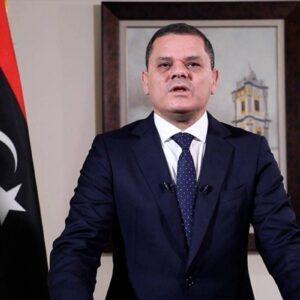Ambassador Mohamed Ghalboun on Opportunities in Trade, Tourism, and Energy Partnerships
 In this special edition of InFocus Libya, we spoke with H.E. Mohamed O. A. Ghalboun, the Ambassador of Libya to Serbia, to explore the renewed efforts to strengthen the longstanding ties between Libya and Serbia. With a shared history of cooperation in construction, healthcare, and energy, the Ambassador highlights opportunities to revitalise bilateral relations through enhanced economic collaboration, tourism development, and cultural exchange. This conversation underscores the potential for strategic partnerships to support mutual growth and prosperity in both nations.
In this special edition of InFocus Libya, we spoke with H.E. Mohamed O. A. Ghalboun, the Ambassador of Libya to Serbia, to explore the renewed efforts to strengthen the longstanding ties between Libya and Serbia. With a shared history of cooperation in construction, healthcare, and energy, the Ambassador highlights opportunities to revitalise bilateral relations through enhanced economic collaboration, tourism development, and cultural exchange. This conversation underscores the potential for strategic partnerships to support mutual growth and prosperity in both nations.
Libya and the former Yugoslavia shared a period of intense and fruitful relations. How can Serbia and Libya build on this historical foundation to revive and strengthen economic cooperation today?
Political relations are traditionally good and friendly. Libya was one of the most important Arab partners of the former Yugoslavia and Serbia during the decades-long rule of Muammar Gaddafi. The backbone of this cooperation in various fields were construction, healthcare and military industry. The political dialogue had been halted in recent years due to the situation in Libya. Still, based on the historical relations between the two friendly countries, the State of Libya desires to strengthen the bonds of cooperation and develop them in various fields, including education, healthcare, economy, trade and energy. We look forward to strengthening these relations more broadly.
For example, Serbian exports in 2021 amounted to 19,453,000 Euro, and imports amounted to 6,436,000 Euro.
There are also several bilateral agreements between the two countries:
- First of all, there is the Trade and Economic Cooperation Agreement with Libya that had entered into force on the 12th of March 1975;
- There is also an agreement between Serbia, Montenegro and Libya on the promotion, guarantee and protection of the investments; this agreement entered into force on the 23rd of April 2008;
- An agreement between the Republic of Serbia and Libya on avoidance of double taxation concerning income tax (entered into force on the 08th of June 2010) and
- Finally, a Memorandum of Understanding on Cooperation in Education between Serbia and Libya entered into force on June 14, 2010.
What initiatives or agreements are currently underway to reinvigorate the partnership between Libya and Serbia?
Firstly, there is a coordination with the Serbian side to host a Serbian exhibition in Tripoli next year. Libya has signed a cooperation agreement with Serbia in training between the Diplomatic Institute of the Ministry of Foreign Affairs of Serbia and International Cooperation of Libya, which aims to enhance cooperation in diplomatic training and the exchange of expertise between the two countries. We also have the Agreement on the Cooperation in the Field of Higher Education between our two countries.
 Both Libya and Serbia face unique challenges in rebuilding their economies. What sectors offer the most promise for cooperation, particularly infrastructure, energy, and trade?
Both Libya and Serbia face unique challenges in rebuilding their economies. What sectors offer the most promise for cooperation, particularly infrastructure, energy, and trade?
To be precise, the transportation and roads and the housing and utilities sectors are among these.
Serbian companies have historically been involved in infrastructure and development projects in Libya. How do you see the role of Serbian expertise in Libya’s ongoing reconstruction efforts?
Libya seeks to attract Serbian companies and introduce them into the Libyan labour market. Serbian companies have a long history of cooperating with Libya, and I would like to point out that Serbia has expertise in construction and building.
Libya seeks to attract Serbian companies and introduce them into the Libyan labour market. Serbian companies have long experience cooperating with Libya, and I would like to point out that Serbia has expertise in construction and building
What opportunities exist for Serbian businesses to invest or expand operations in Libya and vice versa?
There are opportunities for investment in alternative energy and electricity in the agricultural sector, higher education, technical and technological education, and economic and trade sectors. Furthermore, hosting the EXPO 2027 in Belgrade will put Serbia in the spotlight and change the world’s view. Serbia is currently one of Europe’s highest countries in attracting investments and modernising technology and digitalisation. We will discuss bilateral relations and mechanisms for enhancing economic and trade cooperation between the two countries. At our meetings, we discussed the arrangements for holding the Serbian Industries Exhibition, scheduled in January 2025, and the two sides also agreed to have a Libyan-Serbian business people forum on the sidelines of this exhibition.
The development of trade and investment relations between Libya and Serbia is significant, and the Government of National Unity is ready to provide all the necessary facilities to Serbian companies and investors wishing to enter the Libyan market
The development of trade and investment relations between Libya and Serbia is significant, and the Government of National Unity is ready to provide all the necessary facilities to Serbian companies and investors wishing to enter the Libyan market. Establishing genuine partnerships between the private sectors in the two countries is important to support economic cooperation.
In addition, the Serbian Ambassador to Libya also confirmed the desire of Serbian companies to work in Libya in several fields such as agriculture, industry, health, and education, stressing the Serbian government’s willingness to enhance cooperation with the Libyan Government of National Unity. The Serbian Minister of Trade also invited the Libyan Minister of Economy and Trade to visit the Republic of Serbia.
We have already coordinated some of that, but the visit was postponed due to the resignation of the Serbian minister.
Inviting Libyan companies to participate in Expo 2027 will allow them to attract more new investments, learn about the comprehensive reform and infrastructure package, and contribute effectively to projects of common interest.
 Libya has a rich cultural heritage and natural attractions, while Serbia’s tourism sector is growing. How can both countries collaborate to promote tourism and cultural exchange between their peoples?
Libya has a rich cultural heritage and natural attractions, while Serbia’s tourism sector is growing. How can both countries collaborate to promote tourism and cultural exchange between their peoples?
The first model could participate in tourism exhibitions, and we will support the tourism team in visiting all tourist areas throughout Libya.
What steps are being taken to improve Libya’s tourism infrastructure, and how might Serbia contribute to these developments?
Through several plans it has developed, Libya seeks to transform its coasts, cities and deserts into tourist resorts that will attract millions of tourists annually.
According to sources from the General Tourism Authority, Libya attracted 125,480 tourists during the previous year. Libya also has 50 sites along its coast that are ready for tourism investment, with equal opportunities for Libyans and foreign investors.
The report issued by the Libyan General Tourism Authority indicated that local investment contributes to these projects by 37.8 per cent. In comparison, foreign investment contributes 26.3 per cent and joint investment (Libyan and foreign) by 35.9 per cent. At the same time, according to some sources from the sector of tourism, there is an increase in the volume of foreign investments in the country due to the many laws passed by Tripoli to encourage foreign investors to implement dozens of investment projects, whether through foreigners or in partnership with the local private sector.
 Operating flights between the two countries would enrich the cooperation in tourism between Libya and Serbia. Libya enjoys a good climate and has a diverse tourist offer, which can enhance the exchange increase in the tourist sector between the two countries. Serbian companies could be involved in investing in these projects.
Operating flights between the two countries would enrich the cooperation in tourism between Libya and Serbia. Libya enjoys a good climate and has a diverse tourist offer, which can enhance the exchange increase in the tourist sector between the two countries. Serbian companies could be involved in investing in these projects.
Libya seeks to transform its coasts, cities, and deserts into tourist resorts that will attract millions of tourists annually. Operating flights between the two countries would enrich the cooperation in tourism between Libya and Serbia
However, some official Libyan sources indicate that the infrastructure of this sector is still weak, especially regarding hotel rooms (with an overall number of 12,000), of which only 2,000 are suitable for tourist accommodation. Also, out of the seven thousand tourist restaurants and cafes spread throughout the country, only 500 can benefit from tourist services.
Libya is one of the countries overlooking the Mediterranean Sea, rich in many ancient Roman cities along its long coast, such as Tripoli, Leptis Magna, and Sabratha, and the Greek cities located in the Green Mountain region, which is located 1,200 km east of Tripoli, as well as desert tourism in southern Libya, which is an area rich in drawings and rock carvings engraved on the mountains of Acacus and Matkhandoush.
Libya is a significant player in the energy market. Are there discussions about energy partnerships between Libya and Serbia, particularly in oil, gas, or renewable energy?
Yes, we seek to make every effort to benefit from Serbian expertise in renewable energy, oil, and gas. Serbia imports oil from Libya, and there is cooperation in this field with Serbia. We also seek to enable Serbian companies to benefit from their expertise in this field.
We seek to make every effort to benefit from Serbian expertise in renewable energy, oil, and gas. Serbia imports oil from Libya, and there is cooperation in this field with Serbia
What is your vision for the Libyan-Serbian partnership over the next decade, and what are the main milestones you aim to achieve during your tenure as Ambassador?
First, I would point to strengthening the commercial and investment economy, then to our goal to bring back Serbian companies so that they can complete their projects in Libya, as well as to strengthening the cooperation in the field of healthcare and health sector, which should also include enhancing expertise in the field of healthcare. We should build bridges of communication directly between health institutions in the two countries, benefiting from health and scientific knowledge and attracting Serbian health companies with modern innovations in the field of healthcare, which should contribute to supporting sustainable development strategies for the health sector in both countries. In addition, we should also work on activating previous agreements, especially in the fields of economy, trade, investment, education and renewable energy.
Finally, let me also mention that reopening the Serbian Embassy in Tripoli at the end of April 2024 is an important step that will strengthen diplomatic relations between Libya and Serbia and facilitate communication between our two friendly nations. This step will surely be a massive contribution to achieving any future initiative.



